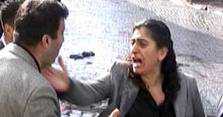 by Sebahat Tuncel
by Sebahat Tuncel
TURKEY often presents itself to the world as a model Muslim democracy, but it is in fact denying basic democratic rights to almost 20 percent of its population. The Turkish prime minister, Recep Tayyip Erdogan, was re-elected on Sunday by a large margin, and he now faces a major domestic challenge. Despite Turkey’s impressive economic growth and increasing international profile during Mr. Erdogan’s eight years in power, his government has ignored the country’s most important and politically explosive issue: Turkey’s oppressed Kurdish minority.
Kurds have been struggling for freedom and autonomy in Turkey for decades — often in the face of violent state repression. We will no longer accept the status quo. We are demanding democratic freedoms, the right to speak our own language in schools and mosques and greater political autonomy in Kurdish-majority regions.
Since Mr. Erdogan’s Justice and Development Party, known as the A.K.P., came to power in the 2002 elections, Turkey has deepened its diplomatic and economic ties with governments across the Middle East, and Mr. Erdogan’s public denunciations of Israel have made him a popular figure throughout the region. But while the prime minister frequently expresses his sorrow over the deaths of Palestinian children, he has not so much as mentioned the Kurdish children who have been killed by the army and the police in Turkey.
Last week, as Syrian refugees fled across the border into Turkey, Mr. Erdogan condemned the Syrian government’s violent crackdown on protesters. He neglected to mention the Turkish government’s use of tear gas, bullets and water cannons to disperse Kurdish protesters in April. Until Mr. Erdogan gets his own house in order, he is in no position to criticize his neighbors.
Indeed, it is impossible for pro-democracy movements in Egypt, Syria or Libya to trust the Turkish government when it neglects its own opposition, suppresses protests and denies the legitimate demands of the Kurdish people.
Mr. Erdogan’s government can follow one of two paths. It can seriously consider these demands, include Kurdish lawmakers in the process of drafting Turkey’s new Constitution, provide constitutional guarantees for the collective rights of the Kurdish people and accept our demand for autonomy that will allow for self-government and bring peace. Or it can insist on the policy of violent suppression that it has pursued to date. If the second path is taken, Turkey could enter a more intense period of conflict than ever before.
Unfortunately, Mr. Erdogan’s recent comment that he would have hanged Abdullah Ocalan, the imprisoned Kurdish nationalist leader, had he been in power when Mr. Ocalan was arrested in 1999 gives the impression that he is leaning toward the second path.
It was not always so. In a 2005 speech in Diyarbakir, Mr. Erdogan declared, “The Kurdish problem is my problem.” It seemed that he had accepted the failure of Ankara’s heavy-handed security policy and was setting a new process in motion. This “Kurdish opening” seemed like a step in the right direction; it offered the possibility of greater language rights, more autonomy and amnesty for antigovernment Kurdish militants.
However, it soon became clear that Mr. Erdogan was not sincere. Despite the Turkish public’s approval of the opening, the A.K.P. did not take serious steps toward resolving the Kurdish problem. On the contrary, it stepped up military operations, banned the leading Kurdish party, the D.T.P., and arrested Kurdish politicians, including me. (I was arrested in November 2006 and spent nine months behind bars, until I was elected to Parliament from prison and granted immunity in July 2007.)
Since then the government has largely ignored the Kurdish people’s grievances. Under the guise of an opening, it has continued the traditional nationalist politics of denial. Rather than meeting the demands of the Kurdish people, it seems that the A.K.P. is now dragging Turkey toward a new confrontation. The election of 36 pro-Kurdish deputies to Parliament will be the most effective check on the A.K.P.’s destructive policy.
As Turkey’s various political parties debate the drafting of a new Constitution, the resolution of the Kurdish issue will be of paramount importance — and this will require the active participation of Kurdish members of Parliament.
The unjustified arrests and military operations must come to an end and Turkey’s Kurds, after decades of struggle, must be granted the right to learn and pray in our own language and exercise self-government in our cities and towns.
Sebahat Tuncel is a Kurdish member of Turkey’s Parliament. This article was translated by Elif Kalaycioglu from the Turkish.
www.nytimes.com, June 17, 2011

Leave a Reply